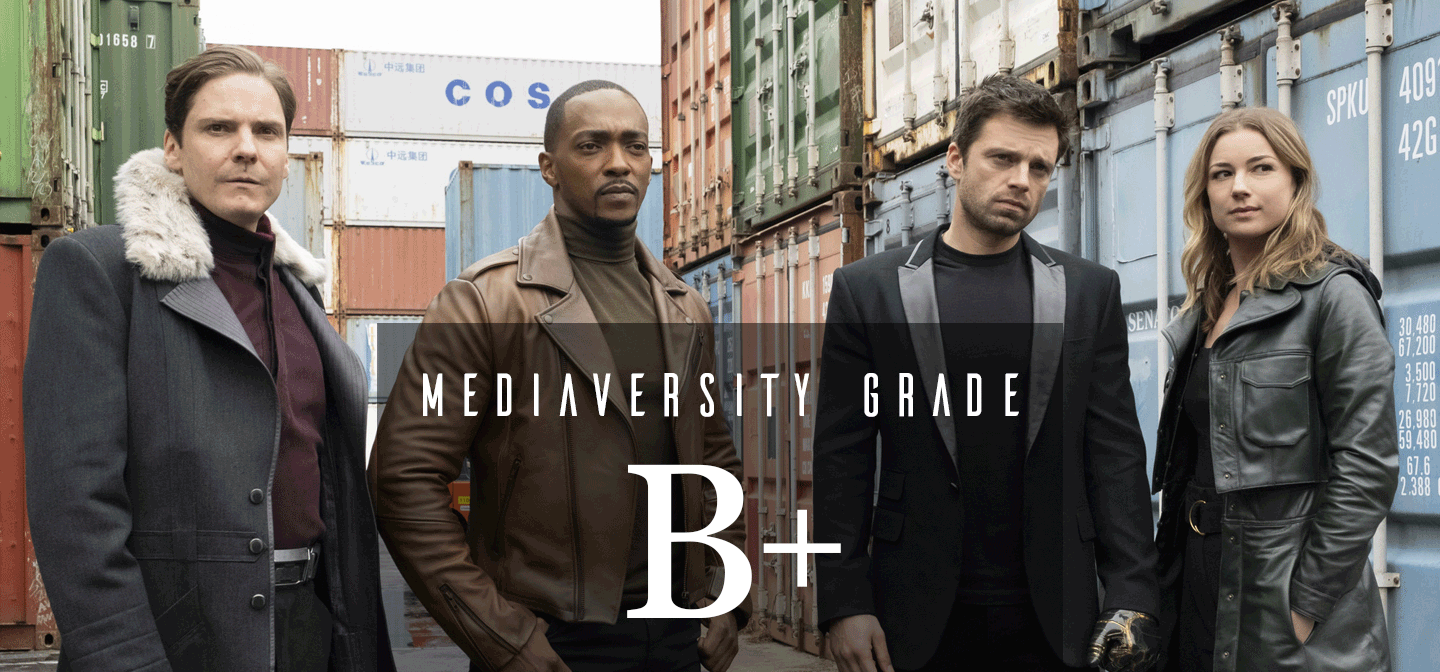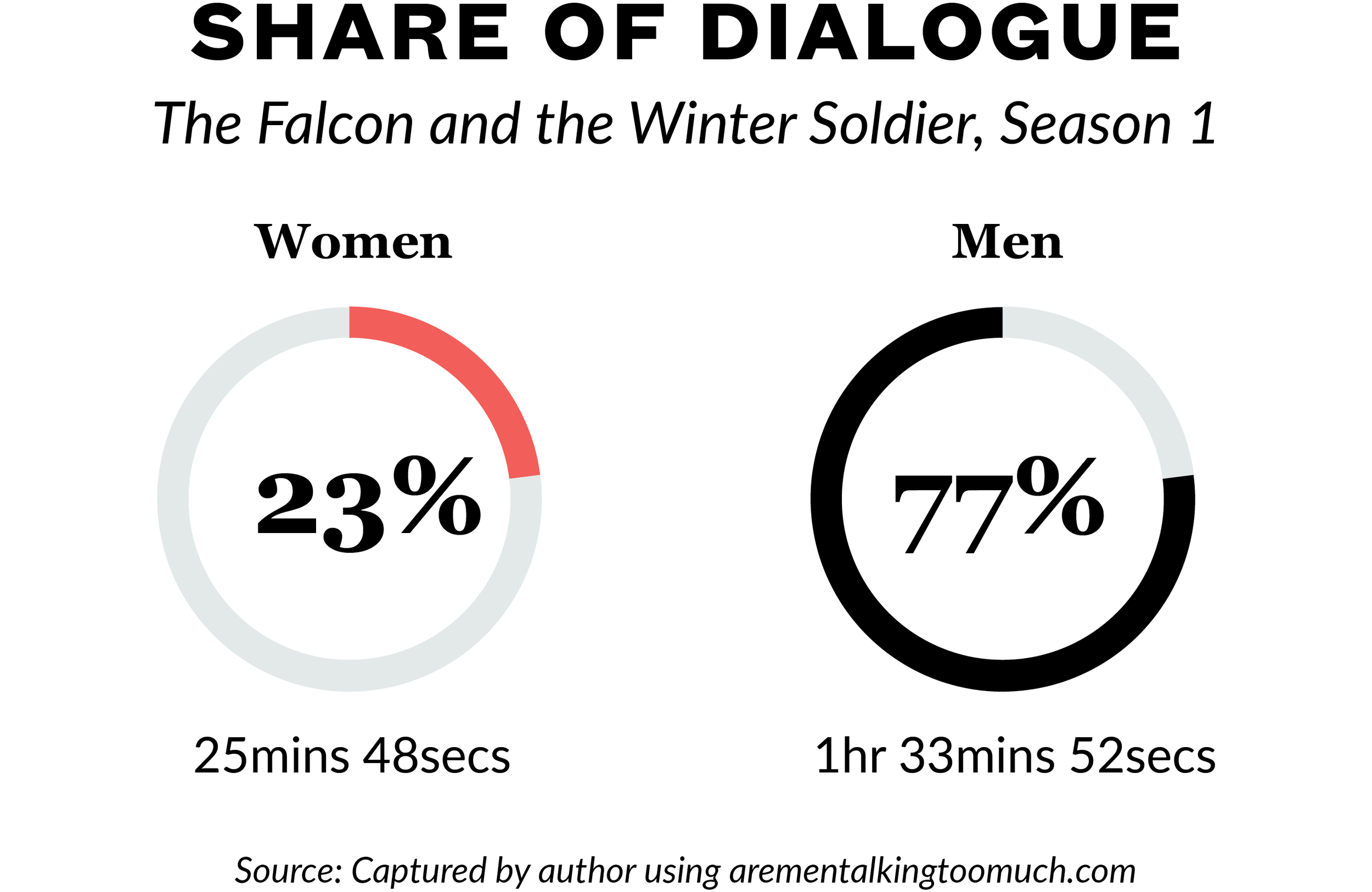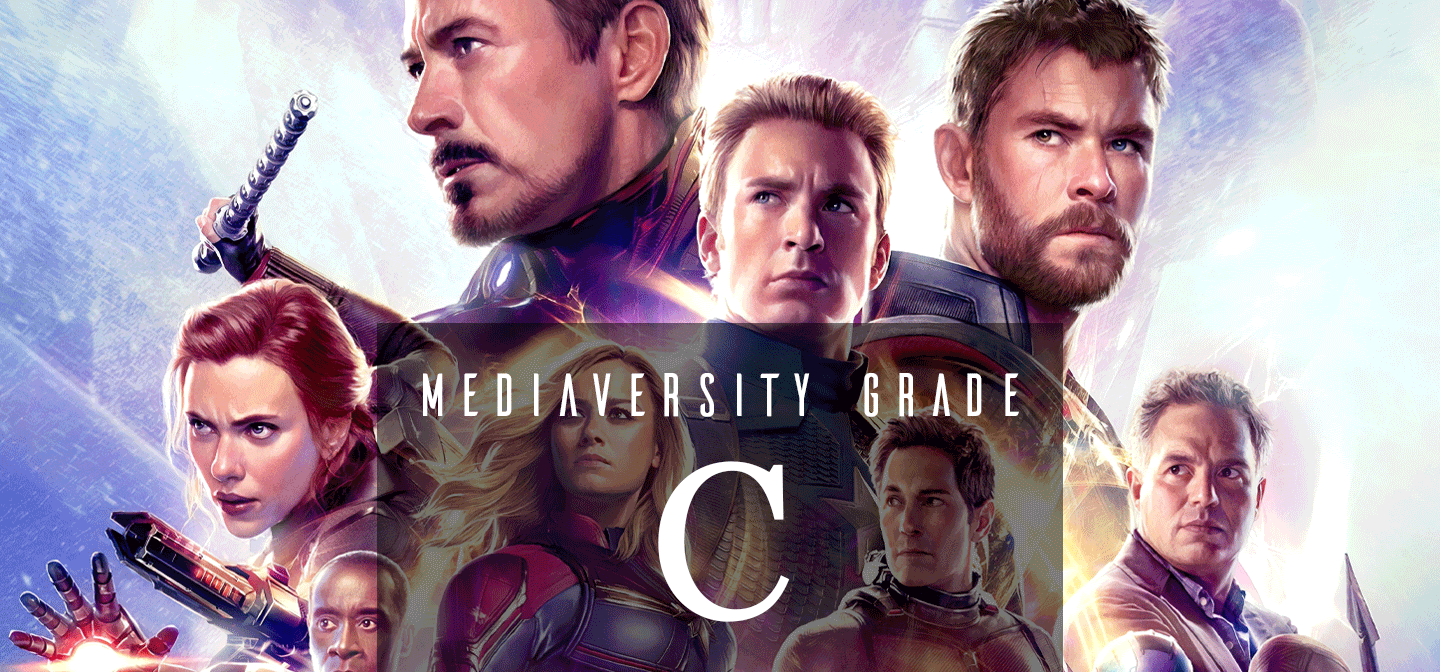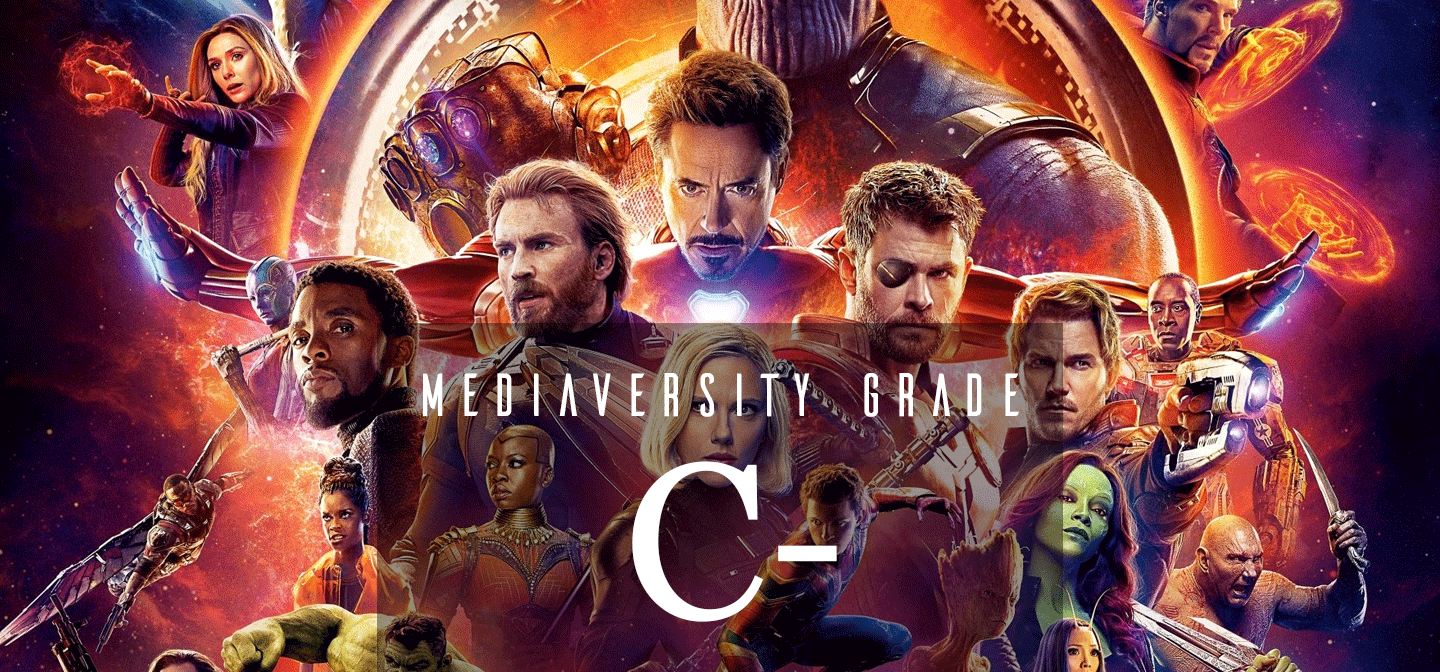The Falcon and the Winter Soldier
“It feels gross to watch flat characters of color fawn over John Walker, yet another ‘flawed but complex’ white man in the MCU.”
Title: The Falcon and the Winter Soldier
Episodes Reviewed: Season 1
Creator: Malcolm Spellman 👨🏽🇺🇸
Director: Kari Skogland 👩🏼🇨🇦 (6 eps)
Writers: Malcolm Spellman 👨🏽🇺🇸 (2 eps), Derek Kolstad 👨🏼🇺🇸 (2 eps), Michael Kastelein 👨🏼🇺🇸 (1 ep), Dalan Musson 👨🏼🇺🇸 (1 ep), and Josef Sawyer 👨🏾🇺🇸 (1 ep)
Reviewed by Li 👩🏻🇺🇸
—MAJOR SPOILERS AHEAD—
Technical: 4.25/5
Disney+’s latest Marvel Cinematic Universe (MCU) series The Falcon and the Winter Soldier gives us a peek into the backstories of some of its most beloved characters. As a big fan of the Chris Evans-led Captain America movies, I couldn't wait for the chance to learn more about the titular superheroes, Falcon’s Sam Wilson (Anthony Mackie) and the Winter Soldier’s Bucky Barnes (Sebastian Stan).
The series doesn’t disappoint, although its too-short length of six episodes leaves a fan hungry for more. From the moment the pilot blasts onto the screen, exciting fight sequences and slick special effects suggest that producers put its $150 million budget to good use. But money can’t solve the pacing issues that follow mid-season, with too many subplots elbowing for space among tonal shifts that veer between heart-stopping stunts to quotidian drama like watching the Wilson siblings apply for a bank loan, to a neon-drenched caper on the lawless island of Madripoor. The art direction feels gorgeous but similarly disjointed, as if belonging to different shows entirely—an odd result given how the same director, Kari Skogland, directed all six episodes.
The show’s best strengths unsurprisingly follow what the MCU has excelled at for decades, of high-velocity fights broken up with enjoyable banter. But showrunner Malcolm Spellman fails to capitalize on its most valuable assets of all: its protagonists. We watch the Falcon and the Winter Soldier embark on their own personal journeys while coming together for ensemble missions shared with characters like the replacement for Captain America, John Walker (Wyatt Russell), and his partner Lemar Hoskins, alias Battlestar (Clé Bennett). In addition, returning faces from the MCU like Baron Zemo (Daniel Brühl) or Sharon Carter (Emily VanCamp) further reduce Sam and Bucky’s opportunities to interact one-on-one. By crowding the screen with so many players, Spellman skimps on showcasing the fantastic chemistry between Mackie and Stan, whose promos sing with hilarious “odd couple” energy that would have made the series resonate even more if given the chance.
Gender: 3.5/5
Does it pass the Bechdel Test? Only 2 of 6 episodes pass
It’s great to see a woman, Skogland, direct each episode. Other important positions like its two producers, Ariella Blejer and Dawn Kamoche, keep staff from skewing too male. However, key creative roles such as the showrunner and writers’ room remain all men. Onscreen, men stay the priority with women as plot-drivers at best—a fact clearly demonstrated by their ridiculously lopsided shares of speaking time:
In fact, the entire season only passes the Bechdel Test in three instances. On the flip side, The Falcon and the Winter Soldier does attempt to move past the MCU’s abysmal track record on women by giving them more to do and in non-stereotypical ways. It succeeds most through Karli Morgenthau (Erin Kellyman), the powerful and earnest leader of an anarchist terrorist organization called the Flag Smashers. She provides the show’s clear villain but writers give her an empathetic storyline, delving into her past as an orphan and her present as a “misguided teenager” (as Sam defends her to the press at one point.) But like a magnet snapping back into place, she falls into the comic book trap of being yet another female character fridged so that men like Sam can enjoy character development.
Thankfully, former S.H.I.E.L.D. agent Sharon Carter endures no such injustice during her four episodes of screen time. After demeaning stints as a single-faceted love interest in Captain America films The Winter Soldier (2014) and Civil War (2016), VanCamp’s Sharon is reborn on Disney+ as a character with grit and independence. In fact, the finale reveals Sharon to be the morally questionable Power Broker—a shadow figure who controls much of Madripoor, where Sharon’s been exiled after the events of Civil War—while post-credits hint at an expanded role for her if the show gets renewed.
It feels a bit frustrating, though, that this late-season twist means both Sharon and Karli become “bad guys” in some form or another, leaving no key women left to unequivocally root for. And besides Sam’s sister Sarah Wilson (Adepero Oduye), who appears in five episodes but only in sidebars as it relates to her brother, women are few and far in between.
Race: 4.25/5
Showrunner Spellman, who is biracial Black and white, helms a creative team of writers and directors who are mostly white. It’s hard not to transpose that dynamic to what’s happening onscreen, where Sam navigates a main cast that’s predominantly white.
To its credit, the series doesn’t shy away from heavy topics and does its best to give a crash course on Race in America™, complete with Sam delivering a monologue in the finale that sounds, as writer Alisha Grauso puts it, “less like an organic moment and more as if Anthony Mackie would turn to the camera at any minute and say, ‘In case you didn't notice, I'm laying out my manifesto as the Black Captain America.’” This isn’t to fault Spellman and writers for their efforts. On the contrary, every theme they introduce has salient points to make, whether about racialized wealth, the history of American experimentation on Black bodies, profiling by the police, or refugee plight. But it’s too much to unpack in what amounts to just two movies’ worth of running time.
The result feels like a glib tour of American race relations as championed by one Black man, Sam, who’s been unfairly tasked with explaining it all to viewers as simply as possible. Meanwhile, non-Black characters of color languish with too little to do. First Lieutenant Joaquín Torres (Danny Ramirez, who is Colombian-Mexican American) arrives early in the season with the intriguing task of infiltrating the Flag Smashers but evaporates from any meaningful scenes by Episode 2. We also meet Karli’s right-hand man Dovich (Desmond Chiam, Chinese-Singaporean Australian), but he barely sees any substance at all. Japanese characters Yori Nakajima (Ken Takemoto) and Leah (Miki Ishikawa) are written well but exist just to pad out Bucky’s backstory.
The writing simply doesn’t feel up to the task of handling race like the light dimmer it is, one that hums high and low depending on the situation. What we see, instead, is a switch flipped on for hammy or moralistic moments—then blinkingly turned off when called for. No more do we see this than in the faceplant of a character arc for Lemar, played by Bennett who is Black Canadian.
Lemar starts off fine if uncreatively as the “Black best friend.” But when he gets killed in Episode 4’s “The Whole World Is Watching,” his death bafflingly serves the redemption arc of this guy:
John snarls: “I…am…Captain…America” (Episode 4)
John rips off the Falcon’s metal wings (Episode 4)
Following Lemar’s death, John becomes so unhinged that the U.S. government strips him of his Captain America moniker. All the while, John’s wife, Olivia—played by multiracial actor Gabrielle Byndloss—unwaveringly supports her husband, with no visible qualms whatsoever. It feels gross to watch flat characters of color fawn over or defend yet another “flawed but complex” white man in the MCU. John’s narrative takes up way too much breathing room in a show with so little to spare.
Lemar to John: “You already have three Medals of Honor. You consistently make the right decisions in the heat of battle.” (Scene from Episode 4)
Lemar’s mom to John: “[Lemar] was so proud of you when they made you Captain America.” (Scene from Episode 5, “Truth”)
Olivia consoles John as he complains: “They just do not know what it takes to be Captain America.” (Scene from Episode 6, “One World, One People”)
All these attributes speak to good intentions but shallow execution on race. Give me a show that skips the hand holding any day—HBO’s Watchmen presents a master class. Hell, the MCU did it once with Black Panther (2018), proving that there are ways to make a bold statement and entertain. The Falcon and the Winter Soldier gets partway there on both accounts.
Disability: 4.5/5
As a superhero with serious post-traumatic stress disorder (PTSD) and a prosthetic arm, Bucky Barnes serves as a positive example of disability in the comic book genre. Ample screen time explores his personal journey in ways that feel realistic: His recovery doesn’t occur in a straight line, nor does it tidily resolve itself by season’s end. Instead, The Falcon and the Winter Soldier resolutely tracks the myriad ways Bucky comes to terms with his trauma, episode after episode, making it that much more gratifying to see how far he’s come by season’s end as Sam urges Bucky to “do the work.”
However, one knock against the series involves a blithe portrayal of a potentially triggering scene: A Black woman warrior, Ayo (Florence Kasumba) of Wakanda, forcibly removes Bucky’s prosthetic arm without his consent. The full context of the scene—laid out comprehensively by writer Stitch, who is Black and disabled—largely declaws what might otherwise be a galling example of ableism. But this slight stumble does add to the sense that while The Falcon and the Winter Soldier prominently highlights a character with mental health issues, his physical disability is more incidental than central.
Bonus for LGBTQ: +0.00
My headcanon states that Bucky Barnes is queer AF. Showrunner Spellman doesn’t appear to disagree, if his coy “I’m not diving down rabbit holes, but just keep watching…” answer during an interview with NME about Bucky’s bisexuality is any indication. That said, the MCU has famously queerbaited its viewers for decades so I’m hardly holding my breath about whose tiger photos Bucky’s been cruising on his dating app.
Mediaversity Grade: B+ 4.13/5
The Falcon and the Winter Soldier teeters from episode to episode like an ungainly film giant learning to walk in shoes made for television. But despite some awkward pacing and tonal shifts, its glossy action roughly paves over those gaps. Slap on a veneer of friendly progressivism and you’ve got yourself a solid new entry to the Marvel universe.






![Lemar’s mom to John: “[Lemar] was so proud of you when they made you Captain America.” (Scene from Episode 5, “Truth”)](https://images.squarespace-cdn.com/content/v1/58e1117febbd1a7ec641bbf3/1620879687372-KZFIPB7H9LRNQ35NQFCB/04-05.png)



